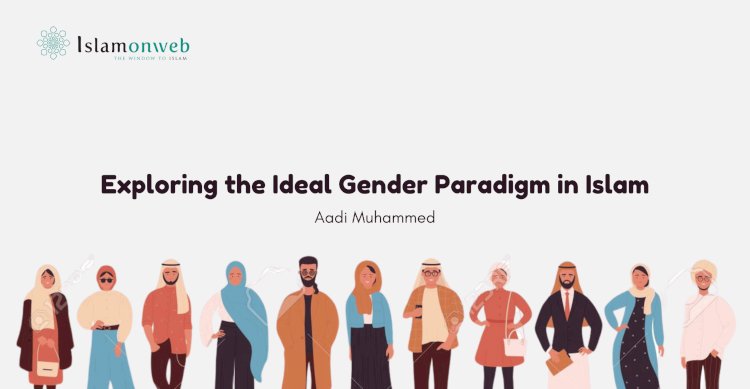Exploring the Ideal Gender Paradigm in Islam
Islam offers a profound and nuanced approach to gender, grounded in divine revelation and the prophetic tradition. Rather than replicating patriarchal systems or mimicking secular egalitarian ideologies, Islam sets forth a balanced and harmonious model of gender equity—one that is spiritually enriching and practically sustainable. Rooted in the Qur'an and Sunnah, this paradigm centres on justice, complementarity, and mutual respect, transcending cultural biases and temporal trends.
The Qur'an affirms the spiritual equality of men and women, stating that both were created from a single soul (nafsin wāḥidah), establishing their shared essence and equal standing before Allah:
“O mankind! Be conscious of your Lord, Who created you from one soul and created from it its mate and dispersed from both of them many men and women. Fear Allah, through Whom you ask one another, and the wombs. Surely Allah is ever an Observer over you.”
(Surah An-Nisā’ 4:1)
This foundational verse dismantles any idea of inherent gender superiority, making it clear that human worth is defined by taqwā (piety), not gender:
“O mankind! We created you from a male and a female and made you into nations and tribes so that you may know one another. Verily, the most noble among you in the sight of Allah is the most righteous of you. Surely Allah is All-Knowing, All-Aware.”
(Surah Al-Ḥujurāt 49:13)
Prophet Muhammad ﷺ echoed this principle in his Farewell Sermon:
“O people! Your Lord is One, and your father is one. There is no superiority of an Arab over a non-Arab, nor of a non-Arab over an Arab, nor of a white person over a black person, nor of a black person over a white person, except by piety.”
This universality applies to gender as well. The Prophet ﷺ said, “Women are the counterparts of men.” (Narrated by Abū Dāwūd)
Both the Qur'an and Sunnah affirm that men and women are spiritually equal, equally accountable for their actions, and share the same moral responsibilities. The Qur'an promises:
“Whoever does righteousness, whether male or female, while being a believer, We will surely grant them a good life, and We will surely give them their reward according to the best of what they used to do.”
(Surah An-Naḥl 16:97)
In narrating the story of Ādam and Ḥawwāʾ, the Qur'an distinctly refrains from singling out Ḥawwāʾ for blame, unlike certain other religious traditions. Instead, it presents both as morally responsible, while specifically holding Ādam accountable for the act of disobedience. The Qur’an states:
“But Satan caused them to slip out of it and removed them from that [condition] in which they had been...”
(Surah Al-Baqarah 2:36)
Yet, the responsibility is clearly placed on Ādam:
“And We had already taken a covenant from Ādam before, but he forgot; and We found not in him determination.”
(Surah Ṭā Hā 20:115)
“Then Satan whispered to him; he said, ‘O Ādam, shall I direct you to the tree of eternity and possession that will not deteriorate?’”
(Surah Ṭā Hā 20:120)
“And Ādam disobeyed his Lord and went astray.”
(Surah Ṭā Hā 20:121)
This explicit mention of Ādam’s disobedience, without any reference to Ḥawwāʾ being at fault, reflects the Qur’anic emphasis on individual accountability. It also aligns with Islam’s broader principle of gender equity, rejecting any notion of inherent moral or spiritual inferiority in women.
Islam revolutionised women’s economic rights at a time when women were often treated as property with no legal or financial autonomy. The Qur'an granted women the right to own, inherit, and manage wealth independently—rights that were unprecedented in many societies of that era. It declares:
“To men belongs a share of what their parents and relatives leave, and to women a share of what their parents and relatives leave, be it little or much – a determined share.”
(Surah An-Nisā’ 4:7)
In Islam, married women retain full ownership of their property and earnings, with no obligation to spend on household expenses. Financial responsibility for the family is placed solely on men, as the Qur’an states:
“Men are the protectors and maintainers of women because Allah has given the one more [strength] than the other and because they support them from their wealth.”
(Surah An-Nisā’ 4:34)
A powerful example of this empowerment is Khadījah bint Khuwaylid, the Prophet’s ﷺ first wife. She was a successful and respected merchant who managed her business independently and played a pivotal role in supporting the Prophet ﷺ, especially during the early and most challenging years of his mission. Her life stands as a testament to the economic agency and dignity Islam affords women.
In the realm of family life, Islam promotes mutual respect, love, and compassion. The Qur'an portrays marriage as a partnership founded on tranquillity and mercy:
“And among His signs is that He created for you spouses from among yourselves that you may find tranquillity in them, and He placed between you love and mercy. Indeed, in that are signs for a people who reflect.”
(Surah Ar-Rūm 30:21)
The Prophet Muhammad ﷺ exemplified these values in his relationship with his wives. He said,
“The best of you are those who are best to their families, and I am the best of you to my family.”
He actively participated in household tasks, treated his family with kindness, and never resorted to physical or emotional harm, embodying compassion, equity, and respect in the home.
Islam also honours motherhood, recognising the immense sacrifices and contributions of mothers. The Qur'an commands kindness to parents, particularly highlighting the hardship of childbirth and nurturing:
“We have enjoined upon man [care] for his parents. His mother carried him, [increasing her] in weakness upon weakness, and his weaning is in two years. Be grateful to Me and to your parents; to Me is the [final] destination.”
(Surah Luqmān 31:14)
When a man asked the Prophet ﷺ who deserved his best companionship, the Prophet replied, “Your mother,” three times before mentioning “your father”—a powerful affirmation of the elevated status Islam grants to mothers.
Education is a fundamental right and duty for both men and women in Islam. The Prophet Muhammad ﷺ declared:
“Seeking knowledge is an obligation upon every Muslim.”
This inclusive command highlights that the pursuit of knowledge is not limited by gender. Throughout Islamic history, women have played significant roles in scholarship and intellectual life.
ʿĀ’ishah bint Abī Bakr, the Prophet’s ﷺ wife, was a renowned scholar and jurist whose contributions to Islamic jurisprudence are widely acknowledged. Scholars, both men and women, sought her guidance on religious matters. Another notable figure is Fāṭimah al-Fihrī, a Muslim woman who founded the University of Al-Qarawiyyīn in Morocco—recognized as the world’s oldest continuously operating university—demonstrating the pivotal role Muslim women have played in advancing education.
Islamic law also guarantees equality before the judiciary, stressing justice for all individuals, regardless of gender. Women in early Islamic society actively engaged in public life, including legal and political matters. During the caliphate of ʿUmar ibn al-Khaṭṭāb, Shifāʾ bint ʿAbdullāh was appointed as a market supervisor, a role that involved oversight of commercial and administrative affairs—an example of women holding significant public responsibilities.
The Qur'an also presents Queen Bilqīs (the Queen of Sheba) as a model of wisdom and just leadership, highlighting her political acumen and sound judgment:
“Indeed, I found a woman ruling over them, and she has been given of everything, and she has a great throne.”
(Surah An-Naml 27:23)
While Islamic teachings emphasise modesty and decorum in gender interactions, they do not restrict women from contributing to the betterment and development of society. Islam’s rich tradition affirms both the rights and responsibilities of women in all spheres of life, from education and governance to justice and public service.
Islamic gender concepts are often misunderstood, largely due to cultural practices that diverge from authentic Islamic teachings. The Qur’an’s guidance is rooted in the principle of complementarity, where men and women have distinct yet equally valuable roles. This divine balance fosters harmony within the family and society, reflecting wisdom beyond human constructs.
For example, while Islam assigns men the responsibility of financial provision, it does not confine women to domestic roles. Women have the freedom to pursue careers, engage in trade, and participate in public life. The Prophet’s ﷺ wives exemplify this versatility—Khadījah was a successful businesswoman, while ʿĀ’ishah was a scholar and educator, both contributing meaningfully to family life and the wider community.
The Islamic view of gender transcends simplistic notions of sameness by focusing on equity, justice, and complementarity. It honours the dignity of both men and women, acknowledging their unique strengths and shared responsibilities. Grounded in divine revelation and the prophetic example, this model nurtures a society where mutual respect, cooperation, and balance are not just ideals, but lived realities.
In a world grappling with gender inequality and identity crises, Islam’s balanced and holistic approach offers a timeless and transformative vision. By adhering to the principles of justice, compassion, and accountability, humanity can strive towards the harmony and progress envisioned in the Qur’an and Sunnah.
About the Author:
Aadi Muhammed, an anthropology student at Indira Gandhi National Open University, lives in Kannur. He is passionate about academics and exploring human cultures, with a particular interest in how religion and society intersect.
References:
- Badawi, J. A. (n.d.). Gender Equity in Islam. Retrieved from https://www.iium.edu.my/deed/articles/genderequityinislam.html
- The Qur'an (n.d.). Text and translations from various sources.
- Ibn Ḥanbal, A. (1950). Musnad Aḥmad ibn Ḥanbal. Dār al-Maʿārif.
- Khan, M. M. (1982). Ṣaḥīḥ al-Bukhārī. Riyadh: Maktabat al-Riyadh al-Ḥadīthah.
Disclaimer
The views expressed in this article are the author’s own and do not necessarily mirror Islamonweb’s editorial stance.
























Leave A Comment